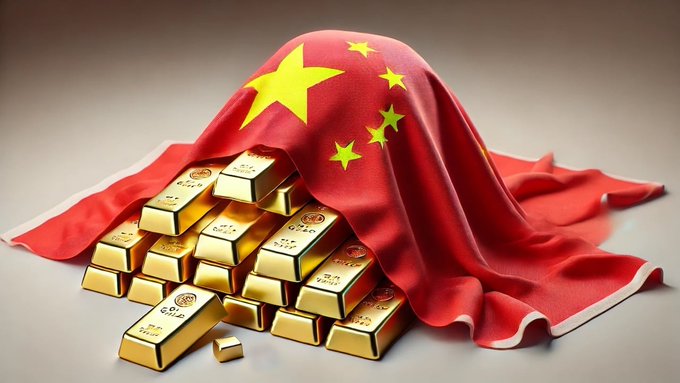
Djole 🇷🇸
@onlydjole
🇨🇳🔥🇺🇲‼️ The US refuses to return Chinese gold: China launched a financial attack on the US - there is no turning back‼️ February 28, 2025 The United States of America faced serious problems because of Chinese gold, according to financial analysts from China. 👇
The US, as a classic capitalist country, seizes every opportunity to make a profit, even if it means keeping foreign government gold reserves under its control. This practice is not new, because numerous countries that entrusted American banks with their gold, later had problems getting it back. According to Chinese sources, the same problem befell Beijing — part of the Chinese gold, which was previously sent to American vaults for safekeeping, is stuck in the United States, and the authorities in Washington refuse to return it. 👇
American resistance to the return of Chinese gold According to information reported by the Chinese publication Sohu, Chinese officials have repeatedly demanded the return of their gold from the US, but have faced constant rejection. "The Americans have repeatedly refused China's request to return their gold," the authors of the article write. 👇
This move by Washington is not surprising given the fact that China and the US have long been geopolitical rivals. The US administration uses every possible opportunity to weaken the economic power of its biggest rival. Keeping hundreds of tons of Chinese gold in U.S. vaults is part of that strategy, as it hinders China's financial stability and prevents Beijing from fully controlling its precious metal reserves. 👇
Many analysts point out that in this way the United States not only demonstrates its financial dominance, but also sends a warning to other countries that might try to break free from American influence. China is not the only country with this problem China is not the only country that has faced a refusal to return its gold reserves from the US. A similar situation happened in Germany a few years ago. Berlin tried to get some of its gold back from the US central bank (Federal Reserve) vaults, but the process took much longer than expected. 👇
🇩🇪 Germany had to make a huge diplomatic effort to reach an agreement to return the gold in several stages, which raised suspicions that the gold may no longer exist in physical form in American vaults. 🇫🇷 France, 🇻🇪 Venezuela and 🇹🇷Turkey also faced similar problems. Back in 2011, Venezuela asked for the return of its gold, and the US later froze those reserves under the pretext of sanctions against the Nicolas Maduro regime. 👇
On the other hand, Turkey, out of fear that it could experience the same scenario, withdrew most of its gold from the US vaults several years ago and returned it to domestic reserves. Russia showed China how to respond China initially tried to solve the problem diplomatically, but it quickly became clear that traditional methods would not yield results. Then the Chinese leaders turned to the strategy previously implemented by Russia. 👇
When relations between Moscow and Washington deteriorated drastically, Russia made a crucial decision — it started selling off US government bonds. The Russian central bank completely got rid of these financial instruments, and invested the funds obtained from the sale in gold. This move proved to be extremely profitable as the price of gold rose significantly due to geopolitical tensions and economic instability on a global level. Now China is using a similar method. 👇
Beijing strikes back — selling off US debt According to Chinese sources, Beijing launched a "beautiful counter-offensive", which made Washington regret its actions. "China has started selling US government bonds, which seriously threatens the stability of the US economy," Sohu analysts said. The difference between the Russian and Chinese responses is that Russia held a relatively small number of US bonds, while China is among the largest foreign holders of US government debt. 👇
Until recently, Beijing held about $850 billion in US Treasuries, but has been rapidly reducing its positions over the past year. Any sale of large amounts of US debt further destabilizes the dollar and causes disruptions in the bond market. If China continues at this pace, the consequences for the US financial system could be catastrophic. 👇
Global echoes of Chinese strategy China's decision to reduce the share of US debt in its reserves has already caused reactions around the world. Experts point out that such a move could encourage other countries to follow China's example, which would further weaken the position of the dollar as a global reserve currency. In the long term, this could lead to a multipolar financial order in which the dollar will no longer be dominant and gold will once again play a key role in global economic relations.










